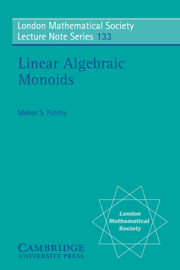Book contents
- Frontmatter
- Contents
- Preface
- Notation
- 1 Abstract Semigroups
- 2 Algebraic Geometry
- 3 Linear Algebraic Semigroups
- 4 Linear Algebraic Groups
- 5 Connected Algebraic Semigroups
- 6 Connected Algebraic Monoids
- 7 Reductive Groups and Regular Semigroups
- 8 Diagonal Monoids
- 9 Cross-Section Lattices
- 10 –Structure
- 11 Rennerfs Decomposition and Related Finite Semigroups
- 12 Biordered Sets
- 13 Tits Buildings
- 14 System of Idempotents
- 15 ℐirreducible and ℐ-co-reducible Monoids
- 16 Renner's Extension Principle and Classification
- References
- Index
16 - Renner's Extension Principle and Classification
Published online by Cambridge University Press: 20 February 2010
- Frontmatter
- Contents
- Preface
- Notation
- 1 Abstract Semigroups
- 2 Algebraic Geometry
- 3 Linear Algebraic Semigroups
- 4 Linear Algebraic Groups
- 5 Connected Algebraic Semigroups
- 6 Connected Algebraic Monoids
- 7 Reductive Groups and Regular Semigroups
- 8 Diagonal Monoids
- 9 Cross-Section Lattices
- 10 –Structure
- 11 Rennerfs Decomposition and Related Finite Semigroups
- 12 Biordered Sets
- 13 Tits Buildings
- 14 System of Idempotents
- 15 ℐirreducible and ℐ-co-reducible Monoids
- 16 Renner's Extension Principle and Classification
- References
- Index
Summary
In this chapter, we will need some additional algebraic geometry.
Definition 16.1. Let X,Y be irreducible affine varieties, φ: X → Y a dominant morphism. Then
(i)φ is finite if K[X] is an integral extension of φ*(K[Y]) ≡ K[Y].
(ii) φ is birational if there exists a non–empty open subset U of Y such that φ | φ–1 (U) : φ–1 (U) →U is an isomorphism.
Remark 16.2.
(i) If φ is finite, then it is closed (and hence surjective) and the inverse image of any point in Y is a finite set. See [34; Proposition 4.2].
(ii) Let be connected regular monoids with zero, a dominant homomorphism. If φ is finite, the clearly φ–1 (0) = {0}. The converse has been shown by Renner [91; Proposition 3.4.13], Equivalently φ is idempotent separating (Theorem 10.12). The homomorphism of Example 3.12 is not finite.
Definition 16.3. Let X be an irreducible affine variety. Then
(i) X is normal if K[X] is integrally closed, i.e., the integral closure of K[X] in K(X) is K[X].
(ii) The normalization of X is where is an irreducible normal affine variety, is a finite birational morphism.
Remark 16.4. Normality is a local property: X is normal if and only if for all x ε X, the ring 0x – {f/g|f,g ε K[X], g(x) ≠ 0} is integrally closed. In particular if X is normal, then any affine open subset of X is also normal.
- Type
- Chapter
- Information
- Linear Algebraic Monoids , pp. 156 - 162Publisher: Cambridge University PressPrint publication year: 1988



